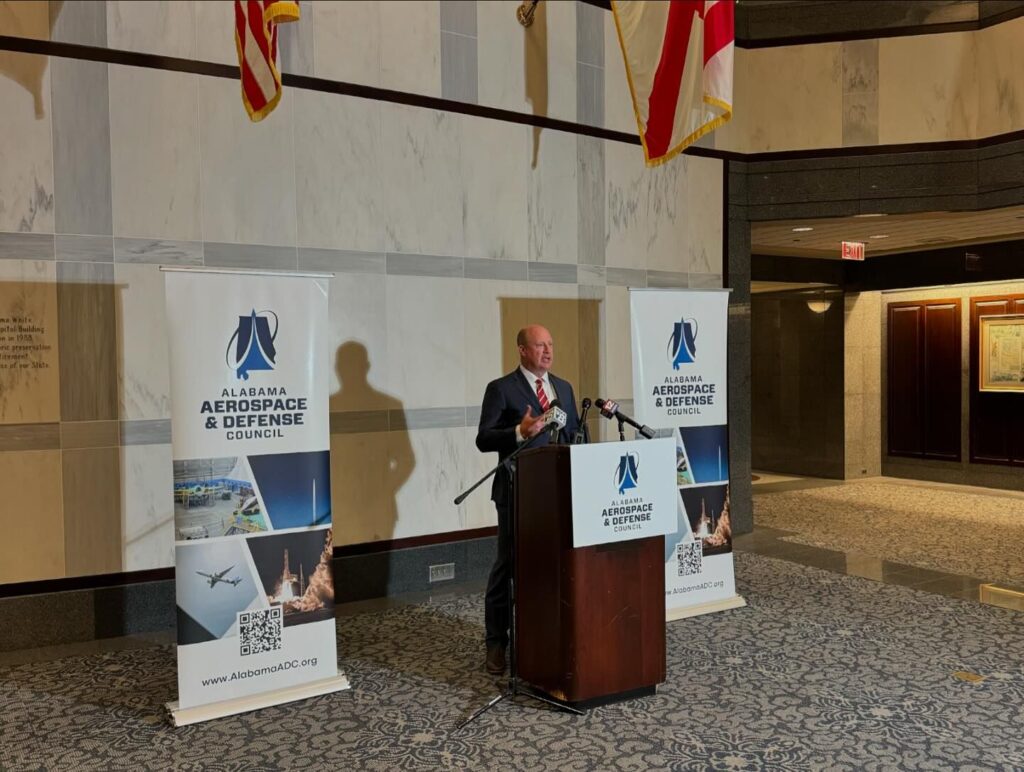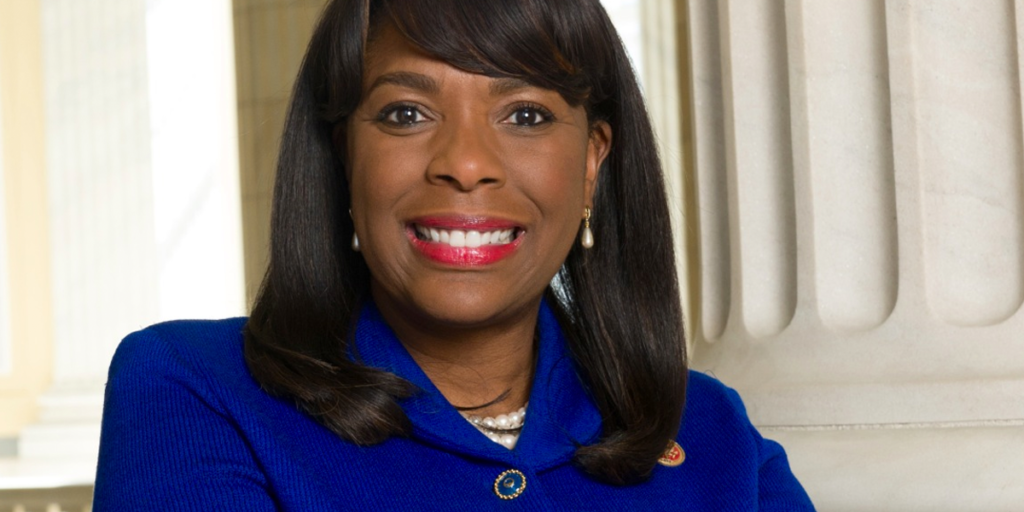Will Ainsworth celebrates the launch of the Alabama Aerospace and Defense Council

Lieutenant Governor Will Ainsworth joined with business leaders and officials from across the state today to announce the formation of the new Alabama Aerospace and Defense Council (AADC), a group that will advocate for policies that encourage the growth of Alabama’s already significant aerospace and defense industries. According to their website, the AADC’s mission is “to enhance the aerospace and defense industry’s contributions to Alabama’s economy. By advocating for supportive legislation and engaging with industry and government, we help ensure that Alabama remains a leader in aerospace and defense innovation.” They list the following four priorities: Promote awareness of the economic benefits provided by the aerospace and defense industry. Advocate for policies that support industry growth and sustainability. Provide a platform for industry leaders to collaborate with state leadership and policy influencers. Foster connections between aerospace companies and decision-makers to build a unified, strong community. In a statement released by his office Ainsworth said, “Alabama is the aerospace and defense capital of the world, but we need to adopt a 67 county approach to ensure that every portion of our state shares in the jobs and investments that these important industries provide.” Ainsworth is a former national president of the Aerospace States Association. According to the AADC website, “Our steering committee includes leaders from Lockheed Martin, Boeing, Airbus, Raytheon Technologies, and United Launch Alliance, who work hand-in-hand with state and national stakeholders to ensure the continued success of aerospace and defense in Alabama.” “I think we would like to see more people get involved both business people and frankly students,” Lockheed Martin representative Joe Rice said at the event according to a report on WSFA Channel 12. “We have to grow up the next generation of people to work these jobs in Alabama.” Ainsworth stressed the important role Alabama has in the space industry saying, “More than 103 Alabama companies participate in the Artemis program that will soon take us back to the moon, and Mobile is on its way to becoming one of the largest commercial aerospace manufacturing cities on the planet, but even with these impressive benchmarks, we can do more.”
Lt. Gov. Will Ainsworth announces $179 million in capital improvement grants for K-12 public schools

On Friday, Lieutenant Governor Will Ainsworth announced that almost $179 million has been officially awarded to 327 K-12 public schools across the state that submitted applications and demonstrated a need for capital improvements in their facilities. The Alabama K-12 Capital Grant Program, which was created by the Legislature during its 2023 regular session, allowed public schools to apply for one-time funding for needed capital projects, deferred maintenance, technology improvements, school security enhancements, or existing debt service. The lieutenant governor was statutorily responsible for administering and overseeing the application, review, and award process. “Before awarding grants, we consulted with lawmakers across the state to gather their insights because they know their districts and the biggest needs within them,” Ainsworth said. “We reviewed each application with strict adherence to the law, prioritized the schools and systems where funding would make the biggest impact, and worked hard to make sure each geographic region and area of the state received a fair allocation.” Award letters were mailed to school systems this week, and once requested financial information has been submitted, funding will be released. 80% of the grants were awarded to schools in which more than half of the students are considered “at-risk.” Grants were awarded in 137 school systems across Alabama and will positively impact more than 226,000 students The average grant amount awarded was $546,032.11, and the precise total of grants awarded was $178,552,500.
Terri Sewell applauds Gov. Kay Ivey’s approval of controversial West Alabama Highway project

On Monday, Alabama Governor Kay Ivey approved the West Alabama Highway project, signing the Alabama Department of Transportation (ALDOT) contracts to proceed with the five-laning. Congresswoman Terri Sewell (D-AL07), who represents much of the area, applauded the governor’s action. Sewell said on the social media platform known as X, “I applaud @GovernorKayIvey for approving the West Alabama Corridor Project. This project will bring much-needed jobs and economic development to communities in the Black Belt. Allowing it to move forward was the right thing to do.” The contracts to proceed with the project were held up for 45 days by the Legislature’s Contract Review Committee. State Senator Chris Elliott (R-Daphne) held up the contracts because he argued that the expensive projects would slow the timeline on other projects like widening Interstate 65. “They are trying to lock this down while she (Ivey) is still in there,” Elliott said. Elliott was also concerned about the lack of federal support for the project. “They never asked,” Elliott said of ALDOT. “They are not going to ask. They said something about getting those federal grants is too difficult, and they have not had luck in the past.” Lieutenant Governor Will Ainsworth also opposes the project in a rare public rift with the Governor. The dispute centers around a nearly $75 million contract to design the 83 miles of widening of the road necessary to make it five lanes from Mobile to Florence. The controversial project broke going toward that project, which broke ground in 2021. It aims to widen a two-lane roadway to four lanes and connect Thomasville to Tuscaloosa. Much of the money to build the project will be borrowed by the state. On Thursday, West Alabama leaders held a rally at the West Alabama Chamber of Commerce where they argued that the project was necessary and will both improve the quality of life and economic development for the region. Kyle South is the President and CEO of the West Alabama Chamber of Commerce. “We stand in support of the investment project known as the West Alabama Highway,” President South said. “We want the West Alabama Highway project to move forward without any further delays.” The Legislature’s Contract Review Committee cannot block a contract. All they can do is draw attention to a contract they find questionable by placing a hold on the signing of the contract. Once 45 days have passed, the Governor can sign the contract anyway, as Gov. Ivey did on Monday. The full committee did not vote to place the hold on the contract. Instead, Committee Chairman Dan Roberts (R-Mountain Brook) kept in place a committee policy where a single member can hold up a contract, which is what Elliott did. Elliott kept his hold in place for the 45-day maximum period of time. Terri Sewell has represented the Seventh Congressional District since 2011. To connect with the author of this story or to comment, email brandonmreporter@gmail.com.
Federal Courthouse in Tuscaloosa to be renamed for Richard Shelby

The U.S. Courthouse and Federal Building in downtown Tuscaloosa will be renamed on Friday, September 15, for former U.S. Senator Richard Shelby (R-Alabama). A ceremony will be held at 2:00 p.m. on September 15 inside the courthouse at 2005 University Blvd. to officially rename it the Richard Shelby Federal Building and Courthouse. Shelby, Alabama Gov. Kay Ivey, U.S. Sen. Katie Britt, and other officials and dignitaries are expected to attend. L. Scott Coogler is the Chief U.S. District Judge for the Northern District of Alabama. “Many years before construction began on the Tuscaloosa Federal Building and Courthouse in December 2009, Senator Shelby foresaw how important this building would be, not only to the federal court system but also to the citizens of Alabama,” said Judge Coogler. Shelby was honored by the West Alabama Chamber of Commerce during their annual awards banquet in February. “As he has done with so many other worthy causes that have benefitted the state of Alabama, Senator Shelby worked tirelessly to secure funding for this building,” Coogler added. “Without question, this building should bear his name.” President Joe Biden signed the legislation to rename the federal building in March 2022. The Courthouse houses the U.S. District and Bankruptcy courts, including courtrooms and support spaces, the U.S. Probation Office, the U.S. Marshals Service, the Federal Bureau of Investigation, U.S. Senator Katie Britt’s Office, the U.S. Attorney’s Office, the General Services Administration, and the Social Security Administration. The Alabama Legislature and Gov. Ivey honored Shelby with a special joint meeting of the Legislature in the historic 1859 House Chamber, where he served as a state legislator. Ivey said, “We are here today, honoring a friend to all of Alabama. To Richard Shelby, I say welcome home. We are honored to have you back.” “He is the state’s longest-serving Senator at 36 years,” Ivey said. Ivey said that out of all the great senators the state of Alabama has had, they have been “eclipsed by Senator Shelby.” Ivey praised Shelby for having steered hundreds of millions of dollars in engineering and sciences funding to Alabama colleges and universities, as well as Redstone Arsenal, the Port of Mobile, and other projects across the state. “We wish you the best, and we proudly welcome you back to our sweet home Alabama,” Ivey concluded. Lieutenant Governor Will Ainsworth said Shelby “should be forever known as Alabama’s greatest builder.” “Perhaps the most important and lasting thing that Richard Shelby has built is his legacy,” Ainsworth said. “His legacy will be felt long after Richard Shelby and all who gather in this room have passed by generations of Alabamians not yet born.” Shelby was a city prosecutor for the City of Tuscaloosa. He then became a special assistant Alabama Attorney General. He represented Tuscaloosa in the Alabama State Senate District from 1970 to 1978. In 1978, he was elected to represent Alabama’s Seventh Congressional District. He served four terms in the U.S. House of Representatives. In 1986, he was elected to the U.S. Senate. He served six terms in the Senate, ending his decades of public service in 2022. To connect with the author of this story or to comment, email brandonmreporter@gmail.com.
Lt. Gov. Will Ainsworth announces opening of applications for $179 million in grant open for public schools

Lieutenant Governor Will Ainsworth announced on Tuesday that the application process for a new $179 million grant program for K-12 public schools across the state officially opened. The Alabama K-12 Capital Grant Program, which was created by the Legislature during its 2023 regular session, allows public schools to apply for one-time funding for needed capital projects, deferred maintenance, technology improvements, school security enhancements, or existing debt service. The lieutenant governor is statutorily responsible for creating, administering, and overseeing the application process. “This grant program offers a unique and historic opportunity to address longstanding needs within our local schools across the state,” Ainsworth said. “Our goal is to ensure that the funding is used to improve the educational experience for students, teachers, and parents alike.” Applications for funding must be submitted by the superintendents of local systems making the requests, and supporting documents, such as budgets, plans of action, photos, contracts, financial records, and others, will be required. In most cases, systems will be required to provide matching funds, the amount of which is calculated based on a sliding scale formula specific to the school potentially receiving a grant. The formula considers variables that include the population of the school, the local funds available, and the number of students receiving free or reduced lunches. All applications will be submitted through an online portal, the web address of which was provided to superintendents via email. Grant requests may be submitted at any point during the next 45 days, but the deadline for applications is 5 p.m. on Friday, October 20, 2023. Once the process is complete and all applications have been thoroughly reviewed, approved projects will be announced before the end of the calendar year.
Akiesha Anderson: Alabama’s grocery tax reduction: A penny saved, a better future paved

The first stop on the road to untaxing groceries in Alabama is straight ahead. Lawmakers achieved a significant victory for the people this year by passing legislation to cut the state’s 4-cent grocery tax by half. That change will begin this Labor Day weekend, as the first 1-cent reduction takes effect September 1. Ultimately, this small change likely will result in large savings for Alabamians who are working hard to make ends meet. Once the new law is fully implemented, many families will have hundreds of dollars more available each year to spend on food or other expenses. For decades, Alabama Arise has focused on reducing and ultimately eliminating the state sales tax on groceries, which essentially taxes survival. At the beginning of the 2023 legislative session, Alabama stood as one of only three states with no tax break on groceries. Thanks to determined advocacy by Arise members and other advocates, our state is off that shameful list at last. The story behind the legislative triumph Arise collaborated this year with many partners and lawmakers to introduce and pass the grocery tax reduction. That list includes the Alabama Grocers Association, Lt. Gov. Will Ainsworth, Sens. Andrew Jones and Merika Coleman, and Reps. Danny Garrett and Penni McClammy. This year’s breakthrough also would not have happened without other legislative champions who laid the groundwork for this moment, including former Reps. John Knight and Thad McClammy, former Sen. Hank Sanders and Reps. Laura Hall, and Mary Moore. The grocery tax law’s passage is a testament to the importance of continuing to hold the line and fight for change for as long as it takes. It’s also a testament to the importance of seizing the moment when opportunity arrives. Something spectacular happened this year as the stars finally aligned after decades of advocacy. When this year’s session began, many Alabamians were struggling with inflation and higher costs for essentials like eggs and bread. Simultaneously, the state was witnessing strong revenue growth. As elected officials began talking about one-time tax rebates, advocates recognized an opportune moment to make permanent progress on reducing the state grocery tax. And the revenue growth ensured this reduction would not cause severe harm to funding for our children’s public schools. A positive step forward State leaders seized this window of opportunity and united across partisan lines to reduce the grocery tax. It was amazing to witness the culmination of decades of hard work. And it was inspiring to see nearly every legislator co-sponsoring this monumental legislation. Many lawmakers tout this as the state’s largest tax cut ever, and it is one that will provide the biggest everyday benefit to people with low incomes. Ultimately, Alabama Arise remains dedicated to transforming the state’s regressive tax system into a more progressive one. Progressive tax systems levy taxes based on one’s ability to pay, whereas regressive systems work in the reverse. The grocery tax has long exemplified regressive taxation, burdening those with fewer resources by requiring them to pay proportionally more than wealthier individuals. Reducing the state grocery tax is a step in the right direction for tax justice. This penny saved is symbolic of a better future being paved for Alabama. What lies ahead Arise will continue advocating to eliminate the state grocery tax while protecting Education Trust Fund revenues. We look forward to working with the new Joint Study Commission on Grocery Taxation to find a sustainable path forward. Rebalancing Alabama’s upside-down tax system will require both lower taxes for people with low incomes and higher taxes for wealthy households and highly profitable corporations that can afford to pay more. As this year’s grocery tax reduction takes effect, we celebrate its many champions – most notably the Alabamians who stayed vigilant to ensure their voices translated into tangible policy improvements. We also celebrate this policy change as a symbol of progress and unity, and as a testament to what state leaders can accomplish when they put partisanship aside to pass legislation with profound benefits for individuals and communities. Cheers to eliminating the first cent, and to the ongoing journey toward a more prosperous and equitable Alabama! Akiesha Anderson is policy and advocacy director of Alabama Arise, a statewide, member-led nonprofit organization advancing public policies to improve the lives of Alabamians who are marginalized by poverty. Arise’s membership includes faith-based, community, nonprofit and civic groups, grassroots leaders, and individuals from across Alabama.
Will Ainsworth: Alabama’s historic grocery tax goes into effect, but more work remains to finish the job

Alabamians are feeling a bit of relief at the grocery store checkout lines as a result of the tax cut on food that a coalition of conservative lawmakers and I pushed through the Legislature during the 2023 regular session. Beginning on September 1, the state’s four percent sales tax on grocery items was reduced to three percent, and if growth in the Education Trust Fund continues at the same pace as recent years, another $150 million tax cut will automatically go into effect as soon as 2024. My goal is to continue chipping away at the tax until it is eliminated altogether in the near future. Alabama was one of only three states that taxed groceries at the full rate – South Dakota and Mississippi are the others – and we are one of only 13 states in the nation that levy any tax on food. The newly-implemented tax cut applies to any food that falls under the definitions of the federal food stamp program, known as SNAP in D.C. circles, which means all groceries are covered except for pre-prepared, hot food from in-store delis. A clause in the law that is now in effect blocks cities and counties from raising their sales taxes on groceries so Alabamians can be assured of the intended savings, but mayors, council members, and commissions do have the option of following our lead and cutting the local sales taxes on groceries if they choose. For several decades, advocacy groups pushed to remove the grocery tax, but their plans always required new taxes to be shifted onto the backs of the middle class in order to offset revenue losses. As a conservative Republican who believes in cutting taxes, not simply moving them around like a rigged shell game, such proposals were considered non-starters in my eyes and those of my GOP colleagues. During my term in the Alabama House and now, as lieutenant governor, it became obvious that the commonsense budgeting practices put in place after Republicans gained control of the Legislature in 2010 were creating surpluses and comfortable fiscal cushions that did not previously exist. The pro-business measures we enacted were also creating an economic atmosphere that attracted both new and expanding industries and encouraged employers ranging from the largest companies to the smallest mom-and-pop storefronts to create new jobs and opportunities for Alabamians who were willing to work. Soon enough, the unprecedented revenues flowing into the state treasury meant we could afford to begin eliminating the grocery tax without burdening any Alabamians with new or offsetting levies. I worked closely with Sen. Andrew Jones (R – Centre), House Education Budget Chair Danny Garrett (R – Trussville), and Senate Education Budget Chair Arthur Orr (R – Decatur) to create a workable plan that also offered full protection to public education funding for K-12 schools, community colleges, and four-year universities. I personally met with countless experts, advisors, and associations, including the grocers who collect the tax at the point of sale, and rallied them to join us in taking action. Once the bill was drafted, my office recruited all 35 members of the Alabama Senate and 100 of the 105 House members to sign on as sponsors, which was considered by many pundits to be a political miracle in the highly partisan and philosophically contentious times in which we live. The legislation eventually passed both chambers with unanimous, bipartisan support. It is estimated that our dinner table tax cut will save the average Alabama family the cost of two weeks of groceries, which is essential when Bidenomics is causing inflation to skyrocket along with the price of gas and other everyday essentials. Between 2022 and 2023, the cost of food rose by an average of 7.7%, according to the U.S. Bureau of Labor Statistics. Eggs alone cost a third more than they did last year, bread and cereal are up by 25%, and meat, fish, and chicken are substantially higher. Our success in cutting the grocery tax demonstrates what can be accomplished if we stay true to our conservative beliefs, build consensus, and have the courage to attempt to accomplish what many say can’t be done. But the job is only half-complete. We must eliminate the second half of the grocery tax, and a legislative study group we empaneled is already running the numbers, making plans, and putting together a blueprint to accomplish that goal. In the meantime, Alabamians will find their wallets are just a bit fatter, and their bank accounts are just a bit fuller as savings at the checkout continue to accrue, but rest assured that my colleagues and I are working hard to finish our mission of providing you with full relief from taxes on the groceries you purchase. Will Ainsworth has served as lieutenant governor of Alabama since 2019.
Gov. Kay Ivey announces plan to widen Interstate 65 in Shelby County, other projects

Alabama Gov. Kay Ivey announced three major interstate construction projects Thursday, including the widening of Interstate 65 in Shelby County. Ivey announced the $500 million in construction projects during a news conference in Hoover. The largest project is the widening of I-65 from Alabaster to Calera. The stretch of roadway south of Birmingham is often congested with commuter and commercial traffic. The project is expected to increase the width of the interstate from two lanes each way to three lanes each way __ jumping from four lanes to six overall. The project, which includes multiple bridges over rail tracks and roadways, will cost an estimated $300 million, according to Ivey’s office. “It was exciting to think about this announcement as I drove up 65 this morning, seeing the progress we are making around Clanton and the progress we have already made around Alabaster,” Ivey said. “Improving Alabama’s infrastructure is one of my top priorities as governor.” The widening of Interstate 65, which runs from the Tennessee-Alabama state line to Mobile, has emerged as a political issue. Lt. Gov. Will Ainsworth said the state should make it a priority to widen all of I-65 to six lanes. The second largest project is the construction of a new interchange to connect Interstate 459 to Highway 150 and South Shades Crest Road in Hoover. The final project is to widen a four-mile (6.4 kilometer) stretch of Interstate 59 from I-459 to Chalkville Mountain Road. Republished with the permission of The Associated Press.
Steve Flowers: Summer Political Happenings

As the long, hot summer ends and Labor Day approaches, let’s take a look back at what occurred over the last three summer months politically. First of all, it was one of the hottest summers on record. Temperatures soared into the hundreds as early as late June. On one of those late June days, one of the hottest political events of the year occurred. The annual Tomato Sandwich Lunch event hosted by Alabama Agriculture Commissioner Rick Pate was the biggest yet. The twentieth annual Tomato Sandwich Lunch held at the Ed Teague Arena near the Garrett Coliseum was a must-be event for Alabama political elite. The Tomato Sandwich Lunch promotes produce from local farmers and encourages people to eat Alabama-grown products. Alabama-based vendors donate all of the food for the event. Commissioner Rick Pate was a master host to over 500 attendees. In attendance were U.S. Senator Katie Britt, State Treasurer Young Boozer, and Lt. Governor Will Ainsworth. PSC member Jeremy Oden came from Cullman, and State Board of Education President Wayne Reynolds came from Athens. State Judges in attendance were Supreme Court Judge Greg Cook, Criminal Appeals Court Judge Bill Cole, and Civil Appeals Court Judges Matt Friday and Bill Thompson. Legislators spotted were State Senators Josh Carnley and Will Barfoot, as well as Representatives Jerry Starnes, Margie Wilcox, Van Smith, and Ed Oliver. There were dozens of local County Commissioners from all over the state. Many of the state’s most prominent lobbyists were there, along with many of the Governor’s Cabinet members. Alabama Power Government Affairs guru Houston Smith and Alfa Executive Director Paul Pinyan were prominent. In fact, most of Alfa’s governmental affairs folks were at this very fun and political event. During the summer, everybody and their brother, or at least everyone who ever won a 4-H speaking contest, entered the race for the Republican nomination for President. There must be 20 people running against Donald Trump for the GOP nomination. This is just what Trump was hoping for. It splinters the anti-Trump vote to such a degree that it virtually assures him the nomination. During the summer, the U.S. Supreme Court decided that Alabama’s Congressional districts were gerrymandered to keep Black voters from being able to elect a second Black Democrat to Congress. Alabama currently has six white Republican Congressmen and one Black Democratic Congresswoman, Terri Sewell. In July, former Alabama Supreme Court Justice Mike Bolin won a special election to fill a seat on the five-member Jefferson County Commission. His election was like manna from Heaven for the Jefferson County Republican Party. The commissioner, who departed this important seat, was a Republican. The commission had a three to two Republican majority. Therefore, it was an important election for the state’s largest and most important county. Mike Bolin had just retired from the Alabama Supreme Court after 18 years on the state’s high tribunal. He had been Probate Judge of Jefferson County for 16 years prior to his service on the Supreme Court. He only retired from the Supreme Court due to a state law that prevents judges from running for reelection after age 70. Bolin is Jefferson County through and through and one of the most respected gentlemen and public servants in Jefferson County and Alabama. The imperial county of Jefferson is fortunate that Judge Mike Bolin was available and ready to serve. His swearing-in ceremony occurred on a sweltering hot July 31. The large Jefferson County Courthouse commission chambers was overflowing. It was a congregation of who’s who of Jefferson County politics. Hope you had a good summer. Happy football season and happy Labor Day! See you next week. Steve Flowers is Alabama’s leading political columnist. His weekly column appears in over 60 Alabama newspapers. He served 16 years in the state legislature. Steve may be reached at www.steveflowers.us.
Report: Alabama teacher’s union gave millions to many GOP lawmakers

A recent report by the conservative Alabama Policy Institute says Republican state lawmakers have received millions of dollars in contributions from the state teacher’s union despite a party ban. According to the report, the Alabama Education Association was the most significant contributor to GOP candidates in the last election cycle. The report says the teachers’ union gave House members in the 2022-23 reporting period $875,000 in direct contributions and senators $682,500. The teachers’ union has given more than $2.4 million to 85 of the 105 members of the GOP-majority House over their careers. The Alabama House has 76 GOP members, along with 27 Democrats, and only 18 Republican representatives declined union contributions. According to the report, only seven state senators have passed on union cash, while over their careers, the rest took in $1.51 million. The state has 27 GOP senators and eight Democrats. While many lawmakers were happy to receive campaign cash from the teachers’ union, most statewide officials, including Gov. Kay Ivey, didn’t partake. Some notable exceptions included three members of the state Board of Education – Tracie West, Yvette Richardson, Tonya Chestnut, and Wayne Reynolds – and Lt. Gov. Will Ainsworth, a Republican who received $60,000 of the $195,000 given to statewide officials over the course of their electoral careers. Download PDF Republished with the permission of The Center Square.
Will Ainsworth: Alabama’s historic grocery tax cut shows me we must always attempt to accomplish what others say can’t be done

Alabamians may have felt their wallets bulge a bit last month when the Legislature approved our bill that slices the sales tax on groceries in half and implements the single largest tax cut in state history. Alabama was one of only three states that taxed groceries at the full rate – South Dakota and Mississippi are the others – and we were one of only 13 states in the nation that levied any tax on food. But beginning on September 1, 2023, Alabama’s 4% state sales tax on groceries will be cut to 3%, and another percent will be automatically deducted when revenues in the Education Trust Fund reach a trigger point that is set in the bill, which is expected to occur as soon as the next fiscal year. Safety provisions have been put in place to ensure that education dollars are protected as the $300 million tax cut goes into effect, and we remain dedicated to fully funding our K-12 public schools, community colleges, and public universities at all times. The bill uses the same definition of groceries as the federal food stamp program, known in D.C. nomenclature as SNAP, which means all groceries will be covered except for pre-prepared, hot food from grocery store delis. A close in the legislation blocks cities and counties from raising their sales taxes on groceries so Alabamians can be assured of the intended savings, but it does allow officials in city halls and county complexes to follow the Legislature’s lead and cut the local food tax, if they choose. For several decades, elected officials and advocacy groups across Alabama have attempted to reduce or remove the grocery tax, but their plans always required other taxes to be raised in order to offset the revenue losses. Many of those suggested tax increases targeted middle-class families, which always doomed the efforts from the start, especially among hardcore Republicans like me. As lieutenant governor, though, I noticed that the conservative budgeting practices implemented since Republicans gained control of the Legislature in 2010 have provided Alabama’s coffers with a sizable financial cushion that did not exist before. Our state’s business sector – ranging from the largest employers to the smallest, mom-and-pop operations – remains healthy, and our continuing success in attracting both new and expanding industries is resulting in unprecedented revenues flowing to the treasury. Putting pencil to paper and running the numbers soon revealed to me that Alabama could afford to cut the grocery tax without needing to penalize any groups or individuals by raising their existing levies. I met with countless experts, advisors, and associations, including the grocers who collect the tax at the point of sale, to rally them to take immediate action and worked with Sen. Andrew Jones (R – Centre), House Education Budget Chair Danny Garrett (R – Trussville), and Senate Education Budget Chair Arthur Orr (R – Decatur) to create a workable plan. Once lawmakers were briefed on our proposal, support for it spread like wildfire. All 35 members of the Alabama Senate agreed to serve as sponsors, along with 100 of the 105 members of the House. I am told by many longtime State House observers that no major bill of such significance has ever achieved the same unanimous and bipartisan support. Our dinner table tax cut will save the average Alabama family the cost of two weeks of groceries, and that financial relief is much needed in the current economic environment because the liberal fiscal policies being pushed and promoted by Joe Biden and congressional Democrats have caused inflation to skyrocket. Between 2022 and 2023, the cost of food rose by an average of 7.7%, according to the U.S. Bureau of Labor Statistics. Eggs alone cost a third more than they did last year, bread and cereal are up by 25%, and meat, fish, and chicken are substantially higher. Our success in cutting the grocery tax demonstrates what can be accomplished if we stay true to our conservative beliefs, build consensus among lawmakers, and have the courage to attempt to accomplish what many say can’t be done. But the job is only half-complete, and work still lies ahead as I am determined and fully committed to abolishing the grocery tax altogether. I ask all of you to join me in thanking each member of the legislature for supporting this historic tax cut. It was a true bipartisan effort. Together, we will continue making an already great state even better. Will Ainsworth has served as lieutenant governor of Alabama since 2019.
Alabama legislative session ends today

On Tuesday, the Alabama Legislature will meet in Montgomery for the last day of the 2023 Alabama Regular Legislative Session. The Alabama Constitution limits the legislative session to a maximum of 30 days, and Tuesday is legislative day 30. The primary constitutional purpose of the regular legislative session is to pass the budgets. Alabama has two budgets: the education trust fund (ETF) and the state general fund (SGF). The budgets were completed on Thursday, May 25. The fiscal year 2024 budgets are the largest in state history and have been signed by Alabama Governor Kay Ivey. It includes two supplemental appropriations that go into immediate effect. The budgets include 2 percent raises for teachers and state workers. “I am proud to officially put my signature on yet another historic investment in our students, teachers, and schools,” Ivey said. “Alabama is serious about changing the trajectory of student outcomes, and our steady progress in the classroom and this record-setting education budget prove that to be the Gospel Truth. We are expanding our award-winning pre-K program into some of our highest poverty areas. We are supporting the implementation of the Critical Literacy and Numeracy Acts. We are, once again, increasing teacher pay, giving us even more of a competitive edge to recruit and retain the educators of today and tomorrow. The second purpose of the session is to pass legislation. The state Legislature has done this. Eight hundred eighty-three bills were introduced during this session. Tuesday will be the last day a bill can be passed, as any bill not sent to the governor by the end of the day will have to be reintroduced in the next legislative session. The Legislature has passed dozens of bills this session. Notably, the Legislature passed significant tax cuts by reducing the 4 percent state sales taxes on groceries. Lieutenant Governor Will Ainsworth said on Facebook, “BOOM! We just passed the largest tax cut in Alabama history. Thank you to every member of the House and Senate who supported cutting the grocery tax. The real winners are Alabama’s taxpayers.” The Legislature is also working on reducing state income taxes on overtime pay. Speaker of the House Nathaniel Ledbetter (R-Rainsville) said on social media, “Eliminating the state’s overtime tax rewards hard-working Alabamians and their employers. The Alabama House will keep finding ways to reduce taxes, just as we did by cutting the grocery tax in half. I look forward to Governor Kay Ivey signing HB217 into law soon.” In addition to the tax cuts, the Legislature passed tax rebates. Every tax filer will get a $150 check from the government. Couples who file jointly can expect $300. A key priority of this session for Gov. Ivey has been her “Game Plan” to renew and expand the state’s economic incentives to further grow the Alabama economy. “The Game Plan will give Alabama’s team the tools it needs to extend our winning record in economic development and help us unleash a new wave of growth and innovation across the state,” said Gov. Ivey. “From our rural areas to our big cities, this is going to benefit every corner of Alabama.” Another priority of this session was to get tough on the crime problem. The Legislature has passed bills to stiffen penalties on organized retail theft, fentanyl traffickers, and street racers, as well as penalty enhancements for gang members and other criminal organizations. The next scheduled legislative session will begin on February 6, 2024. To connect with the author of this story or to comment, email brandonmreporter@gmail.com.


